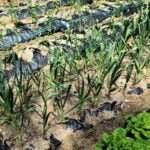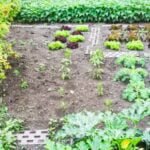Leaf compost, also known as leaf mold, is a valuable organic material that has gained popularity among gardeners for its numerous benefits. One common question that arises among enthusiasts is, “Is leaf compost good for vegetable gardens?” The answer to this query is a resounding yes.
When we talk about leaf compost and its benefits for soil health, we are delving into the realm of sustainable gardening practices. Leaf compost is essentially decomposed leaves that have gone through a natural process of breaking down into a nutrient-rich substance. This natural fertilizer not only enriches the soil but also improves its structure, promotes better drainage, and helps suppress weeds.
One of the key advantages of using leaf compost in vegetable gardens lies in its nutrient content. From essential macronutrients like nitrogen, phosphorus, and potassium to micronutrients such as calcium and magnesium, leaf compost provides a balanced source of nutrition for your plants. By incorporating leaf compost into your gardening routine, you are essentially giving your vegetables the necessary boost to thrive and produce bountiful harvests.
What Is Leaf Compost
Leaf compost, also known as leaf mold, is a valuable organic material that can greatly benefit vegetable gardens. It is created through the decomposition of leaves, typically over a period of six months to two years. During this process, microorganisms break down the leaves into a dark, crumbly substance that is rich in nutrients and beneficial for soil health.
One of the key benefits of leaf compost is its nutrient content. This organic material contains essential nutrients such as nitrogen, phosphorus, and potassium, which are vital for the growth and development of plants in vegetable gardens. Additionally, leaf compost is also a great source of micronutrients like calcium, magnesium, and zinc, which further contribute to the overall health of the soil and plants.
In addition to its nutrient content, leaf compost plays a crucial role in improving soil structure. When incorporated into vegetable gardens, it helps to loosen compacted soil, allowing for better root growth and enhancing drainage. The organic matter in leaf compost also increases the soil’s ability to retain moisture, reducing the risk of water runoff and erosion. Overall, using leaf compost in vegetable gardens can lead to healthier plants with stronger root systems and improved resistance to environmental stressors.
| Benefit | Description |
|---|---|
| Nutrient Content | Contains essential nutrients like nitrogen, phosphorus, potassium |
| Soil Structure Improvement | Loosens compacted soil, enhances drainage and root growth |
| Weed Suppression | Helps suppress weed growth in vegetable gardens |
Nutrient Content of Leaf Compost
Organic Matter
One of the key components of leaf compost that makes it beneficial for vegetable gardens is its high organic matter content. Organic matter provides a food source for beneficial microorganisms in the soil, promoting healthy soil structure and nutrient availability for plants. As the organic matter in leaf compost decomposes, it releases essential nutrients slowly over time, ensuring a steady supply of nourishment for your vegetable plants.
Nitrogen
Leaf compost is rich in nitrogen, an essential nutrient for plant growth and development. Nitrogen is crucial for the formation of proteins, enzymes, and chlorophyll in plants, making it necessary for overall plant health. By incorporating leaf compost into your vegetable garden, you can boost the nitrogen levels in the soil, supporting robust vegetative growth in your crops. This nutrient helps enhance foliage production and ensures vibrant green leaves in your vegetables.
Phosphorus and Potassium
In addition to nitrogen, leaf compost also contains significant levels of phosphorus and potassium. Phosphorus plays a vital role in root development, flower formation, and fruit set in vegetable plants. Potassium aids in overall plant vigor, disease resistance, and stress tolerance.
By adding leaf compost to your vegetable garden beds, you can supplement these essential macronutrients, promoting balanced nutrition for your crops. The presence of phosphorus and potassium
Improving Soil Structure
What Impacts Soil Structure?
Soil structure plays a crucial role in the health and productivity of vegetable gardens. The arrangement of mineral particles, organic matter, air spaces, and water in soil determines its structure. When soil is compacted or lacks adequate organic material, it can hinder root growth and water infiltration. This is where leaf compost comes in as a valuable amendment for improving soil structure.
Benefits of Leaf Compost for Soil Structure
Leaf compost is rich in organic matter, which helps to improve soil structure by loosening compacted soil. The fibrous nature of decomposed leaves creates pore spaces that allow for better air circulation and water retention. This not only benefits the roots of vegetables by providing them with more room to grow and access to essential nutrients but also enhances drainage, preventing waterlogging that can lead to root rot.
Application of Leaf Compost for Soil Improvement
To enhance soil structure in your vegetable garden using leaf compost, simply spread a layer of compost over the garden bed and gently work it into the top few inches of soil. For existing vegetable plants, avoid disturbing their roots when applying compost. Regularly incorporating leaf compost into your garden beds each year will lead to long-term improvements in soil structure, promoting healthier and more productive vegetable crops.
Weed Suppression
Leaf compost is indeed a valuable resource for vegetable gardens, not only for its nutrient content but also for its ability to suppress weeds. Here are some ways in which leaf compost can help keep pesky weeds at bay:
- Physical Barrier: When spread as a mulch layer on the soil surface, leaf compost forms a physical barrier that prevents weed seeds from germinating and reaching the sunlight they need to grow.
- Moisture Retention: Leaf compost helps retain moisture in the soil, which benefits your vegetable plants but can hinder weed growth. Weeds often thrive in dry conditions, so by keeping the soil consistently moist with leaf compost, you can deter weed growth.
- Natural Weed Suppression: As leaf compost breaks down over time, it releases beneficial microorganisms into the soil. These microorganisms compete with weeds for resources and can help naturally suppress weed growth in your vegetable garden.
By using leaf compost to suppress weeds in your vegetable garden, you not only eliminate the need for harmful chemical herbicides but also promote a healthier and more sustainable gardening practice. Remember to apply a thick layer of leaf compost around your plants to maximize its weed-suppressing benefits and keep your vegetable garden thriving without unwanted intruders.
Using Leaf Compost in Vegetable Gardens
Leaf compost is an invaluable resource for vegetable gardens, providing a rich source of nutrients and organic matter that can help improve soil health and promote vigorous plant growth. When properly incorporated into garden beds, leaf compost can enhance the structure of the soil, improve drainage, suppress weeds, and ultimately lead to bountiful harvests of delicious vegetables.
One of the most effective ways to utilize leaf compost in your vegetable garden is by mixing it into the existing soil. Simply spread a layer of leaf compost over the topsoil and then use a garden fork or shovel to work it into the ground. Aim to mix the compost thoroughly to ensure that its nutrients are distributed evenly throughout the soil. This process not only enriches the soil but also helps improve its texture and water retention capabilities.
In addition to incorporating leaf compost directly into the soil, you can also use it as mulch in your vegetable garden. Applying a layer of leaf compost around the base of your plants can help retain moisture in the soil, regulate temperature fluctuations, and prevent weed growth.
As the compost gradually breaks down, it releases nutrients into the surrounding soil, providing ongoing nourishment for your vegetable plants. Overall, using leaf compost as mulch is a simple yet effective way to promote healthy and productive growth in your garden.
Potential Drawbacks of Using Leaf Compost
Leaf compost is a fantastic organic material that can greatly benefit vegetable gardens in various ways. However, it is essential to also be aware of some potential drawbacks or challenges that may arise when using leaf compost in your garden.
Here are some factors to consider when incorporating leaf compost into your vegetable garden:
- Carbon to Nitrogen Ratio: Leaf compost tends to have a high carbon to nitrogen ratio, which means it may break down slowly and temporarily tie up nitrogen in the soil. This can potentially lead to nitrogen deficiency in your plants, especially if the compost is not fully decomposed before being applied.
- pH Imbalance: Depending on the types of leaves used in the composting process, leaf compost can sometimes be acidic. This can affect the pH levels of your soil, making it too acidic for some vegetable plants. It is crucial to test your soil pH regularly and monitor any changes after applying leaf compost.
- Unwanted Seeds: Leaf compost may contain seeds from weeds or other plants that could germinate and grow in your vegetable garden. While most backyard composting processes should kill weed seeds with proper heat levels during decomposition, it’s still possible for some seeds to survive. Keep an eye out for any unexpected plant growths.
Despite these potential challenges, with proper attention and management, leaf compost can still be a valuable addition to your vegetable garden. By monitoring nutrient levels, adjusting pH as needed, and keeping an eye out for weed growth, you can make the most out of this natural soil amendment. Remember that every garden is unique, so observation and adjustments are key when using leaf compost in your vegetable garden.
Success Stories
Many gardeners have reported significant success in their vegetable gardens after incorporating leaf compost into their soil. One such example is Lisa, who had struggled with poor soil quality in her backyard vegetable garden for years. After learning about the benefits of leaf compost from a local gardening expert, she decided to give it a try.
Over the course of a season, Lisa noticed a remarkable improvement in the health and yield of her vegetable plants. The leaf compost not only provided essential nutrients but also improved the soil structure, making it easier for her plants to establish strong root systems.
Another success story comes from Mark, a gardener who was constantly battling stubborn weeds in his vegetable garden. Frustrated with spending hours pulling out weeds every week, he turned to using leaf compost as a natural weed suppressant. To his delight, the layer of leaf compost helped smother out existing weeds and prevent new ones from taking root. Mark was impressed with how effective the leaf compost was in keeping his garden weed-free without resorting to harmful chemicals.
In addition to individual success stories, community gardens have also seen positive results from using leaf compost. The St. John’s Community Garden in downtown area started incorporating leaf compost into their raised beds as part of an initiative to improve soil health and increase vegetable production.
With the help of dedicated volunteers who turned and mixed the leaf compost into the existing soil, the garden saw a significant increase in crop yields and healthier plants overall. The success of this community project has inspired other local gardens to explore the benefits of using leaf compost for their own vegetable plots.
| Success Story | Results |
|---|---|
| Lisa’s Garden | Improved soil health, increased plant yield |
| Mark’s Garden | Natural weed suppression, reduced weed growth |
| St. John’s Community Garden | Increase in crop yields, healthier plants |
Conclusion
In conclusion, it is evident that leaf compost is indeed good for vegetable gardens. The nutrient-rich composition of leaf compost provides essential elements for plant growth and development, contributing to healthier and more abundant produce. Not only does leaf compost improve soil structure and drainage, but it also assists in suppressing weeds, reducing the need for harmful herbicides.
When considering the use of leaf compost in vegetable gardens, gardeners should keep in mind the numerous benefits it offers. By incorporating leaf compost into their gardening practices, individuals can create a sustainable and environmentally friendly way to nourish their plants. Additionally, success stories from experienced gardeners serve as a testament to the positive impact that leaf compost can have on vegetable gardens.
Overall, utilizing leaf compost in vegetable gardens is a natural and effective method to promote plant growth while enhancing soil health. By understanding the process of creating leaf compost, recognizing its nutrient content, and implementing best practices for application, gardeners can reap the many rewards that this organic material has to offer. Embracing the use of leaf compost is not only beneficial for individual gardeners but also contributes towards a more sustainable approach to gardening for future generations.
Frequently Asked Questions
Is Leaf Compost Good for Tomatoes?
Leaf compost can be beneficial for tomatoes as it provides essential nutrients like nitrogen, potassium, and phosphorus that are necessary for healthy plant growth. It also helps improve soil structure and retains moisture, which is beneficial for tomato plants.
What Is the Best Compost to Grow Vegetables In?
The best compost to grow vegetables in is a balanced one that contains a good mix of green and brown materials. This ensures a variety of nutrients for the plants while maintaining proper moisture levels in the soil. Compost made from kitchen scraps, yard waste, and manure is ideal for growing healthy vegetables.
Is Leaf Mulch Good for Vegetable Garden?
Leaf mulch can be beneficial for a vegetable garden as it helps retain soil moisture, suppresses weed growth, and adds organic matter to the soil as it breaks down over time. It can also help regulate soil temperature and prevent erosion, creating a healthier environment for vegetable plants to thrive in.

If you’re looking to get into vegetable gardening, or are just looking for some tips on how to make your current garden better, then you’ve come to the right place! My name is Ethel and I have been gardening for years. In this blog, I’m going to share with you some of my best tips on how to create a successful vegetable garden.





